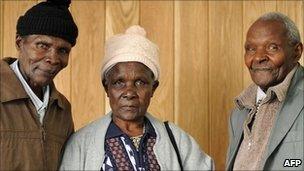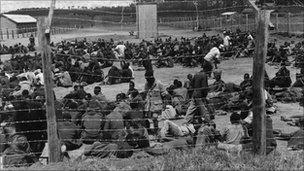Mau Mau Kenyans allowed to sue UK government
- Published

L-R: Ndiku Mutua, Jane Muthoni Mara and Wambugu Wa Nyingi claimed they were tortured
Four elderly Kenyans have been told they can sue the Foreign Office for their alleged torture by British colonial authorities 50 years ago.
The High Court said the group could seek damages over their treatment during the 1950s and 60s.
Mr Justice McCombe said the claimants had an "arguable case" and it would be "dishonourable" to block the action.
Ministers say the UK government is not responsible for the actions of the colonial administration.
The decision means that the government will have to defend accusations of torture, murder, sexual assault and other alleged abuses at a full damages trial in 2012.
The four Kenyans, Ndiku Mutwiwa Mutua, Paulo Muoka Nzili, Wambugu Wa Nyingi and Jane Muthoni Mara, all in their 70s and 80s, say ministers in London approved systematic abuse in special camps. A fifth claimant has died since the action began.
The High Court heard that Mr Mutua and Mr Nzili had been castrated, Mr Nyingi was beaten unconscious in an incident in which 11 men were clubbed to death, and Mrs Mara had been subjected to appalling sexual abuse.
Mr Justice McCombe said in his judgement, external there was "ample evidence" to show there may have been "systematic torture of detainees during the Emergency".
"I emphasise that I have not found that there was systematic torture in the Kenyan camps nor that, if there was, the UK government is liable to detainees, such as the claimants, for what happened.
"I have simply decided that these five claimants have arguable cases in law and on the facts as presently known."
Lost documents
The trial is expected to include critical material from some 17,000 previously lost documents which were discovered earlier this year in the Foreign Office's archives.
The papers include detailed reports of atrocities, external which were sent to ministers in the 1950s and 1960s.
Some of the documents implicate British colonial officials in abuse at detention camps which were set up to smash the pre-independence uprising.
Professor David Anderson of Oxford University, who unearthed the documents, is working with other experts to log the potential evidence.
So far, the names of a further 600 apparent victims have been found in the papers, all of whom could theoretically sue if they are alive.
Martyn Day, solicitor for the Kenyans, said the ruling was a historic judgement.
"Over 50 years ago our clients suffered the most terrible torture at the hands of the British Colonial regime," he said.
"Our clients have been battling for years to obtain justice for what they endured. Our government has seemed hell-bent on preventing that happening.
"They want some sort of justice, an apology, some sort of money that would give them peace in their final years."
Government fights on
Foreign Office minister Henry Bellingham said: "It is right that those who feel they have a case are free to take it to the courts. We understand the pain and grievance felt by those, on all sides, who were involved in the divisive and bloody events of the emergency period in Kenya.

Mau Mau suspects were rounded up in camps
"Despite today's judgment, the government will continue to defend fully these proceedings, given the length of time elapsed and the complex legal and constitutional questions the case raises."
But Gitu Wa Kahengeri of the Mau Mau War Veterans' Association told the BBC's Focus on Africa that he welcomed the ruling.
The British were becoming "just people" and the veterans expected "reasonable compensation", he said.
"They tortured our people, raped our people, castrated our people," he said. "There is no evil they did not do. These atrocities are the cause of the case. We want them to pay for that," Mr Wa Kahengeri said.
Mr Justice McCombe has given the government until the autumn to prepare a defence and additional arguments that the case is too old to be heard.
- Published21 July 2011
- Published9 May 2011
- Published12 April 2011
- Published7 April 2011